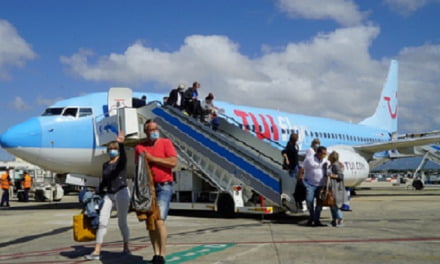
 Unions, and workers rights organisations, the CCOO and the UGT, have this Monday reported “high numbers of contagion and the high percentage of workers affected” among post office employees, with six positive cases detected in the Canary Islands and 57 workers in quarantine, included in the 836 positive cases known among workers nationwide and almost 2,200 Correos workers quarantined as of April 13, according to their latest figures.
Unions, and workers rights organisations, the CCOO and the UGT, have this Monday reported “high numbers of contagion and the high percentage of workers affected” among post office employees, with six positive cases detected in the Canary Islands and 57 workers in quarantine, included in the 836 positive cases known among workers nationwide and almost 2,200 Correos workers quarantined as of April 13, according to their latest figures.This data places the Correos workers almost 5 times above the population average, placing post office workers as one the most potantially contagious industries in the country, at slightly higher risk than state security forces or similar institutions, and with only healthcare workers being at higher risk.
In a statement today, the two major trade unions representing postal workers say that the publicly funded Correos company “hides contagion data by province.” The unions believe that these known figures likely reflect “breaches of health protocols and security measures” on the islands. “The company is hiding information without providing disaggregated data, just a mere confusion of data at the State level and after changing the method of accounting for and identifying cases of infection three times.”
 Here on the islands, unions have denounced “non-compliance” in the Gran Canaria towns of Arucas, Las Palmas de Gran Canaria, Maspalomas, Arguineguín, Puerto Rico de Gran Canaria and Jinámar as well as the Tenerife towns of Tegueste, La Esperanza and Arona; Lanzarote’s Arrecife and Playa Blanca; and in Puerto Rosario.
Here on the islands, unions have denounced “non-compliance” in the Gran Canaria towns of Arucas, Las Palmas de Gran Canaria, Maspalomas, Arguineguín, Puerto Rico de Gran Canaria and Jinámar as well as the Tenerife towns of Tegueste, La Esperanza and Arona; Lanzarote’s Arrecife and Playa Blanca; and in Puerto Rosario.
 According to the unions, for more than 20 days “quarantine protocols have not been applied” throughout the Canary Islands and disinfection measures “for premises and offices have been” insufficient.
According to the unions, for more than 20 days “quarantine protocols have not been applied” throughout the Canary Islands and disinfection measures “for premises and offices have been” insufficient.
In their view, the company managing the Correos post offices has also been increasing the number of daily workers exposed, with members of the workforce allegedly changing from working alternate days to working daily, which they say also generates “discrimination between centres of work and localities “.
In addition, CCOO and UGT understand that not only are Correos workers susceptible to being infected, but, due to the characteristics of the public service they perform and their ability to reach any point in the country, “they could become transmitters of contagion to the public ”













